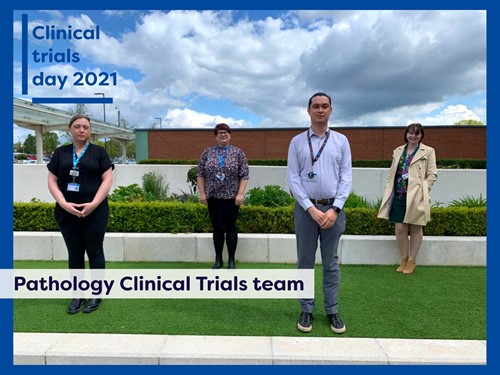Pathology Clinical Trials team

The Pathology Clinical Trials Team work behind the scenes of local, national and international clinical trials to provide advice, analysis and storage of blood and tissue samples.
The Team, which is made up of five, includes three medical laboratory assistants (who provide the day-to-day running of the department), an operational services manager (who provides managerial oversight) and a clinical scientist (who provides clinical assistance).
Despite the Team’s relatively small size they have assisted with over 200 trials since it was founded in 2010.
The Pathology Clinical Trials Team are involved right at the start of most trials which require their services, offering assistance with costings, site selection and laboratory tours to ensure that samples from research participants are considered throughout the study.
The day-to-day operations of the Team vary wildly depending on which trials they are currently supporting and can involve attending surgeries to collect samples, providing specialist analysis of unusual tests or processing samples to be sent to other laboratories. In addition the Pathology Team liaise closely with the clinicians providing the patient-facing side of the research study by answering queries related to sample requirements, types of analysis required for a specific study and providing test results. In many cases the analysis is time critical as a study participant may be waiting for the results of their test before receiving treatment. The Team have been involved in a number of studies which have led to improved patient outcomes including the development of new drugs for cystic fibrosis and cancer.
Due to the Covid-19 pandemic the Pathology Clinical Trials Team’s work has focused on supporting a number of research studies which aim to improve our understanding and outcomes into this disease. For example, the team currently process a large number of samples for studies looking at whether prior Covid-19 infection can prevent re-infection, understanding why some people can become more ill with respiratory infection compared to others and evaluation of the response to vaccines in people with a deficient immune system.